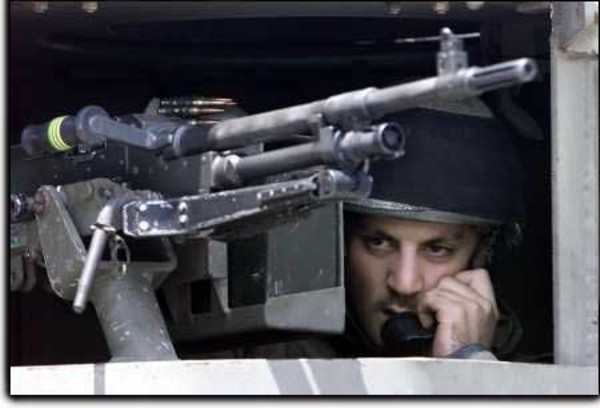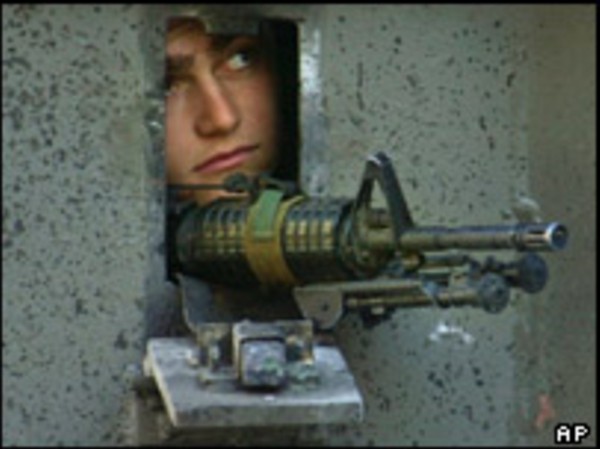
september 2004

.IDF USE PALESTINIAN HOUSES FOR SNIPER ROOSTS
They say if you live long enough, you see everything. Rana Malhas now feels that she has.
She was born in Turkey, 82 years ago. But this gentle, welcoming old woman now lives with relatives in a stone house inside a courtyard with grapes on the vine. Her home is in Balata, a refuge camp on the edge of the city of Nablus. The area is a stronghold of Palestinian militants, who have despatched many suicide bombers.
This week, inside her own home, Rana was held for hours at gunpoint by seven heavily armed Israeli troops, and we(BBC group Reporters)were held with her. We were filming with a local doctor, Ghassan Hamdan, when he was called to treat Rana.
Her house had been occupied by Israeli soldiers. They were driving in and out of the camp, drawing stone-throwing youngsters out onto the streets. It looked like a game of cat and mouse.
Captive
Outside the house there was no sign of any military presence. Dr Hamdan went in, and we followed soon afterwards. But before we found him, Israeli troops found us, forcing us at gunpoint into a disused room on the upper storey - first the cameraman, then the producer, then me.
There we saw Rana, trapped in a chair in the corner, a white headscarf on her silver hair. She was neatly dressed, and alert, flanked protectively by the doctor and a Palestinian paramedic.
Soldiers seized our phones, confiscated our camera tape and when we tried to leave forced us back, at the barrel of a gun. Dr Hamdan stood upright, calm and polite, showing more resignation than surprise. "Three days ago soldiers kept me like this for hours," he said. "It's happened to me about 10 times in the past few years."
All the soldiers were young, some were cocky, sprawled around on the floor. A few busied themselves around the largest window, where a sniper rifle was fixed in position. The commander and the sniper kept their eyes trained on the road below. We could hear shouts, the familiar sounds of clashes, but the disturbances were small.
No deal
Rana leaned forward to speak. Her immediate concern was for us. "I'm so sorry this has happened to you in my house," she said, "and that I can't get you some coffee." Dr Hamdan pleaded to be allowed to move her; Rana's blood pressure was high. The soldiers refused. As the minutes stretched into hours, he asked how long we would be kept there.
"You'll be here until we kill someone," a soldier replied, in perfect English.
"We're being held illegally," I said.
The soldiers nodded in agreement, but still refused to let us go. "You could compromise our operation," one said, "by revealing our location." But there are few secrets in Balata. Local people already knew that troops had been in the house, and might still be there. There were ugly moments as the doctor continued to plead for his patient. "Rana is old," he said "and needs to rest. Why does she have to stay?"
"Because her son blew himself up near my house," one soldier taunted, and then laughed. Rana has no children.
Sniper
Later a few threats were murmured in my direction. "She'll get out of here in a body bag," one soldier said in Hebrew, assuming incorrectly, that we would not understand.
The sniper kept scanning the crowd down below, never leaving his rifle. Other soldiers joined him at the window, suddenly tense. "I see a gun being handed around," one shouted. Others agreed. Then a deafening noise, as the sniper fired one round, hitting someone on the street.
We later learned that a 15-year-old boy had been shot, as he stood near an ambulance. Palestinians deny he was carrying a gun. He was seriously injured, but is still alive. We were kept in the room, at risk of incoming Palestinian fire. But there was none.
After three and a half hours we were freed, and the soldiers left the house.
Downstairs, over coffee flavoured with cardamom, Rana told us how her ordeal began. "I went upstairs after breakfast," she said, "at about 0730, to talk to my birds, the doves. I hadn't seen them for two days and I missed them. Then the soldiers made their appearance. "They didn't let me move, or go to drink water. I've seen a lot of things in my life, but I was face to face with my enemy. Because of my age, I was frightened."
Complaint
After our release, we complained to the authorities.
In a statement the Israelis expressed regret and promised to investigate, but said the soldiers were in Nablus because of specific warnings about possible attacks.
There was no apology for Rana, or Dr Hamdan.
From Our Own Correspondent was
broadcast on Saturday, 14 August, 2004 at 1130 BST on BBC
Radio 4.
Letter from International Protester:
Jamal was downtown at 'the duwar' last evening, at around
18h30, when the Israeli military came into the Old City
firing live rounds and tear gas to disperse a crowd of
rock throwing youth. From two occupied houses, military
snipers where targeting people in the crowd seemingly at
random. Jamal was shot in the back by a live bullet. We
were just returning from a photography exhibition put on
by the Women's Union - about the destruction imposed on
the Old City by the Israeli military in April 2002 - when
we arrived upon the scene. There were no armed men
visible, only stone throwers, some press people and a
handful of medical volunteers. At 23h43, the announcement
was made over the loudspeakers at the Jamaah Kbire (Big
Mosque) that Jamal had joined the ranks of Nablus'
innocent civilian martyrs. 12 hours later Jamal was
buried at the local cemetery near the Old City.
According to the media it is not the Israeli soldiers
entering Palestinian cities who are the aggressors, but
the symbolic resistance of the Old City's youth with
rocks that is portrayed as initiating "attacks on
Israeli soldiers." The IDF goes around in 'patrol
vehicles' and not armored, stone-proof military jeeps and
hummers. Likewise, Israeli military snipers, who were
firing into the unarmed crowd, are instead described
subsequently in Haaretz as "troops who took position
in a nearby building to observe the clashes." Such a
cumbersome euphemism for the word 'sniper' isn't the
product of journalistic convention - which normally seeks
to minimize long-winded expressions - but of a desire to
hide the reality from the Israeli public of who the real
aggressors are.
